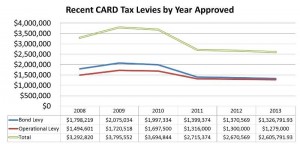The Collinsville Area Recreation District will request less money from property taxpayers for a fourth consecutive year, but the amount may surprise many in the district.
On Dec. 17, CARD Commissioners voted unanimously to levy $1.279 million for district operations, a reduction of $21,000 (1.62 percent) from the previous year. A bond levy of $1,326,791.93 was approved, down from $1,370,659 in 2012.
Residents overwhelmingly approved three referendums last spring to lower the amount CARD can levy for operations. Levies were capped in three funds at 25 percent lower than previous levels, which could have garnered a reduction in CARDs budget of more than $240,000.
CARD Commissioner Mark Achenbach, who led the campaign to approve the referendums, and who was voted in to office in the same election, said the lack of a major reduction is because the board last year “kicked the can down the road.”
“They should have known the referendums were going to pass,” Achenbach said. “Instead of starting to make the hard decisions, they decided to spend down the balances in the restricted funds.”
Previous operational levy reductions were 1.22 percent in 2012, 22.4 percent in 2011 and 1.34 percent in 2010.
CARD Executive Director Terry Wilson said setting the levy last year was difficult because money was moved around in the various funds so often prior to his arrival in July 2012 that it was difficult to ascertain what was needed. The amount levied in each fund in 2012 was consistent with the prior year’s levy, although the total amount decreased by $16,000.
Achenbach said the levy set by the Board of Commissioners in 2012 was done “last second,” was motivated by a desire to appease a public taking note of district finances and did not go far enough to reduce the budget in the funds that were the subject of the referendums.
“They decided they didn’t want the tax rate to go up, so they picked a number and worked backwards,” Achenbach said. “They didn’t make the cuts they needed to in those funds.”
The board in Dec. 2012 consisted of current commissioners Patrick Collins, Mary Ann Bitzer and current president, David Tanzyus, as well as former commissioners Andrew Carruthers – president at the time – and Spike Bryant. The tax levy was approved unanimously.
The referendums lowered the capped rates in the General, Museum and Playground and Recreation funds. Combined, the three funds account for a reduction of $184,000 in the latest tax levy.
The difference is almost offset by increases in restricted funds, primarily the Social Security fund, which increased from $55,000 to $168,000. The Social Security fund levy ranged between $125,000 and $152,000 from 2008 to 2010, before being reduced to $55,000 in 2011 and 2012.
Money from the general funds may have been moved to the restricted funds, which were not at the level they needed to be, prior to his arrival, Wilson said. For the current levy, a decision was also made to keep a balance in the restricted funds, Wilson said. This decision further reduced the impact of the referendum. Both Wilson and Achenbach said carrying balances in the restricted funds is financially responsible.
Achenbach criticized the previous board for levying too little in the Social Security fund. Meeting minutes from Dec. 18, 2012 show he suggested a levy of $100,000 for the fund. The increase in 2013 was Achenbach’s idea, he said.
“We’re levying more than we’re going to spend in the Social Security fund because I brought it up, not anyone else,” Achenbach said.
The Board, when approving the tax levy in 2012, made a conscious decision to spend down the reserves in the restricted funds in 2013 rather than over several years, Achenbach said.
“Last year we spent more than we took in. This year that is not an option. We have no balances to live on. We have the additional burden of building back up the balances,” Achenbach said. “We are forced to bring in more than we spend because other boards spent more than they brought in.”
Achenbach downplayed, but did not dismiss, the possibility of future cuts to operations. “I don’t know how much more we can lower the money that is going out, but I will keep looking for ways to reduce spending,” Achenbach said.
There are currently six fewer people working for the district than when he started, Wilson said.
Achenbach expressed optimism that Wilson will be able to work within the restrictions of the new budget. “I think he’s a fairly creative and talented guy. I think that by the end of the year he’ll probably meet the numbers and we’ll be fine,” Achenbach said.
Despite what would appear to be a tax levy reduction consistent with, if not worse than, reductions in the previous three years, Achenbach said the referendums had the desired effect.
“You got tax relief over what the bill would have been if they hadn’t passed. I think there are people on the board who would have thought that, since the referendum didn’t pass, we could levy more. But that’s just my opinion,” Achenbach said.




